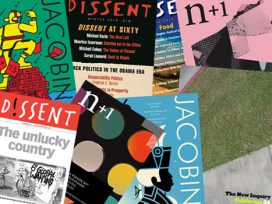17 articles

Cultural journals – a somewhat awkward placeholder term for periodicals between the arts, the sciences and politics – have played a crucial role in the formation of the public spheres in Europe and beyond. From the scholarly journals of the Republic of Letters and the periodicals and pamphlets of the Enlightenment, to the revues of the ‘Age of the Press’, the theory journals of the long 1960s, and the zines of Underground and Punk, journal-making has been an important ‘cultural technology’ that has deeply influenced the way we argue, narrate, write and think.
While there is uncertainty about the future of the book in the digital age, journals have anticipated the ongoing transformation of public spheres and retained a strong presence in intellectual and cultural life. Nevertheless, their future form and sustainability is by no means clear, and it remains to be seen how the internet will change the relationship between periodicals, their readerships and broader public spheres. In order to understand where they are headed, it helps to look at where journals have come from and how their histories can be written.
Despite the historical importance of cultural journals, only recently have they become a clearly defined area of research. Today, intellectual historians, literary scholars and sociologists are asking what it means to write for a journal (as opposed to writing a book, for example), how groups form around journals, how journals shape and are shaped by intellectual history, and what conditions cause them to thrive or struggle. In focusing on their production as well as their reception, we gain insight into the social (mostly collaborative) and economic (often precarious) dimensions of journal-making. It becomes clear that no journal can be understood in isolation. Only by looking at a journal’s relationship to other journals can we learn about its influences and distinctions from other journals.
The Eurozine focal point ‘Worlds of cultural journals’ seek to explore relationships within a transnational ‘ecosystem’ of cultural journals. Common to all the contributions is their treatment of journals – political, cultural, artistic, literary or scientific – as media actors in their own right. What may have been evident to their editors all along is still worth emphasizing: that journals do much more than ‘carry texts’ or ‘mirror social change’. They shape the texts and images they contain; they influence intellectual communities and movements; and they serve as a specific form of archives of social and cultural transformation.
Contributions come from historians and literary scholars affiliated with the Working Group on Periodicals Research and from Eurozine partner journals. They cover the history of cultural journals in specific countries and regions (Poland, the Arab Middle East), specific genres (feminist journals, journals of the New Right, architecture mags), and specific challenges (What makes a good editor? The history and problems of transnational journal networks in Europe). We hope that the focal point will strengthen the conversation between journal editors and journal historians, as well as be of interest to what any successful cultural journal depends on: its readership!
Patrick Eiden-Offe, Anke Jaspers, Moritz Neuffer, Morten Paul and Roman Schmidt for the Working Group on Periodical Research



Thanks to a new wave of small intellectual magazines, an infectious buzz has returned to public debate in the United States. Roman Schmidt talks to David Marcus who, as a new editor at Dissent, is well placed to provide the lowdown what’s driving this genuinely critical movement.
Depression, revolution and the threat of fascism provided the impetus for Bertolt Brecht’s and Walter Benjamin’s magazine “Krise und Kritik” in the 1930s; thirty years later, in a world shaped by decolonization and bloc confrontation, Maurice Blanchot’s “Revue Internationale” was a similar attempt at an engaged form of publishing. Yet its internationalist ambitions ultimately proved to be its downfall, writes Roman Schmidt.

From the Eurozine archive: Antonin J. Liehm, founder of Lettre Internationale and former editor of the Czechoslovak journal ‘Literární noviny’, discusses the role of a European cultural journal before and after 1989 and explains why it is as important as ever to organize a concerted defence of culture.
Antonin J. Liehm, editor of the Czech magazine “Litérarní noviny” until 1968 and founder of “Lettre Internationale”, has been at the forefront of numerous attacks on the “provincialism of major cultures”. One theme has persisted throughout: the idea of an international magazine.



